
Ahmad Jamal was an American jazz pianist, composer, bandleader, and educator. For six decades, he was one of the most successful small-group leaders in jazz. He was a National Endowment for the Arts (NEA) Jazz Master and won a Lifetime Achievement Grammy for his contributions to music history.
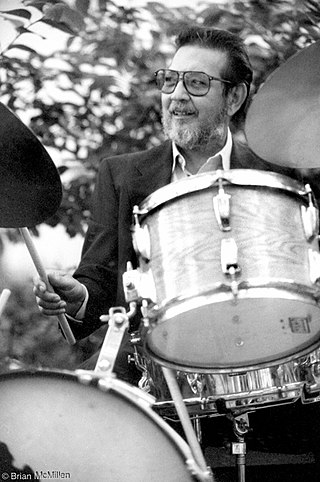
Vernel Anthony Fournier, known from 1975 as Amir Rushdan, was an American jazz drummer probably best known for his work with Ahmad Jamal from 1956 to 1962.
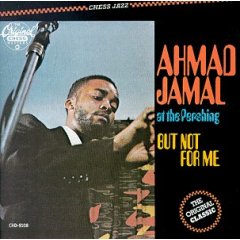
At the Pershing: But Not for Me is a 1958 jazz album by pianist Ahmad Jamal. According to the album jacket, the tapes were made on January 16, 1958, at the Pershing Lounge of Chicago's Pershing Hotel and each set played that night was recorded, a total of 43 tracks, of which 8 were selected by Jamal for the album. The LP was released as Argo Records LP-628. Jamal's previous releases on Argo had been from previously made masters; this was his first release recorded for Argo, and his first album recorded live.
"You Don't Know What Love Is" is a popular song of the Great American Songbook, written by Don Raye (lyrics) and Gene de Paul (music) for the Abbott and Costello film Keep 'Em Flying (1941), in which it was sung by Carol Bruce. The song was deleted from the film prior to release. The song was later included in Behind the Eight Ball (1942), starring the Ritz Brothers. "You Don't Know What Love Is" was again sung by Carol Bruce; it was her third and final film until the 1980s.

Israel Crosby was an American jazz double-bassist born in Chicago, Illinois, United States. One of the finest to emerge during the 1930s, he was also a member of the Ahmad Jamal trio for most of 1954 to 1962. He is credited with taking one of the first recorded full-length bass solos, on his 1935 recording of "Blues of Israel" with drummer Gene Krupa when he was only 16. Crosby died of a heart attack at age 43, two months after joining the Shearing Quintet.

"Poinciana" is a song by Nat Simon with English lyrics by Buddy Bernier and Spanish lyrics written in 1936 by Manuel Lliso.

The Awakening is an album by American jazz pianist Ahmad Jamal featuring performances recorded in 1970 for the Impulse! label.

Freeflight is a live album by American jazz pianist Ahmad Jamal featuring performances recorded at the Montreux Jazz Festival in 1971 for the Impulse! label. Additional performances from this concert were released as Outertimeinnerspace in 1972. It was also the first album to have Jamal play electric piano. The Rhodes Piano was given to him by somebody living in Switzerland, and Jamal said he would continue to play the instrument in the future as well as his standard acoustic piano.

Ahmad Jamal at the Top: Poinciana Revisited is a live album by American jazz pianist Ahmad Jamal featuring performances recorded at The Village Gate in 1968 and released on the Impulse! label.
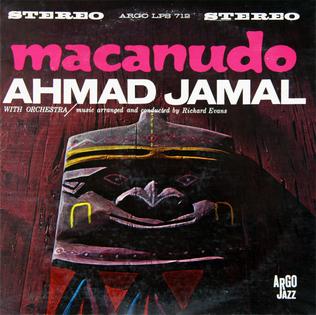
Macanudo is an album by jazz pianist Ahmad Jamal of performances by Jamal with an orchestra conducted by Richard Evans. It was recorded in 1962 and released on the Argo label.

Ahmad Jamal at the Blackhawk is a live album by American jazz pianist Ahmad Jamal featuring performances recorded in San Francisco in 1962 and released on the Argo label.

All of You is a live album by American jazz pianist Ahmad Jamal featuring performances recorded at Jamal's own club in Chicago in 1961 and released on the Argo label. On the cover, photographed by Don Bronstein, one of the first staff photographers for Playboy magazine, Jamal sits in an MAA chair, designed by George Nelson.

Genetic Walk is an album by American jazz pianist Ahmad Jamal featuring performances recorded in 1975 and released on the 20th Century label.

Intervals is an album by American jazz pianist Ahmad Jamal featuring performances recorded in 1980 and released on the 20th Century Fox label.
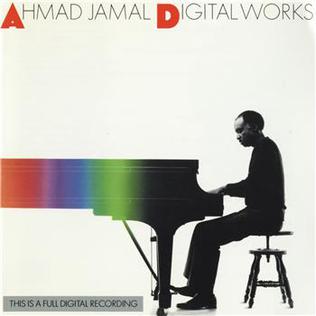
Digital Works is an album by American jazz pianist Ahmad Jamal featuring performances digitally recorded in 1985 and released on the Atlantic label.
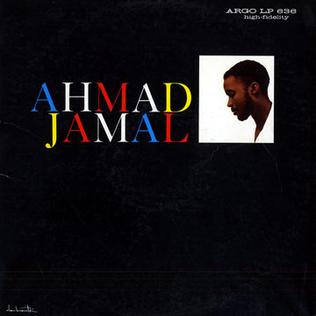
The Ahmad Jamal Trio: Volume IV is a 1958 jazz album by pianist Ahmad Jamal. The album was recorded live on location at the Spotlight Club in Washington, DC, on September 6, 1958. The LP was released as Argo Records LP-636. This was Jamal's first recording following his surprise hit record, At the Pershing: But Not for Me.
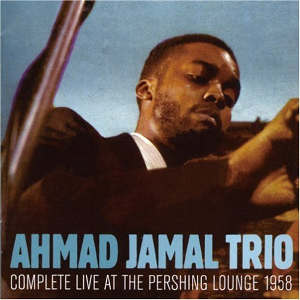
Complete Live at the Pershing Lounge 1958 is an album by jazz pianist Ahmad Jamal. It contains performances recorded at The Pershing Lounge in Chicago, Illinois, in 1958. Some of the performances were released on the albums At the Pershing: But Not for Me and At the Pershing, Vol. 2.

Portfolio of Ahmad Jamal is a live album by American jazz pianist Ahmad Jamal featuring performances recorded live on location at the Spotlite Club in Washington, DC on September 5–6, 1958 and released on Argo in 1959. It includes additional selections from the engagement where Ahmad Jamal Trio Volume IV was recorded, and the complete recordings from these shows were released on 2007's Complete Live at the Spotlight Club 1958 on the Gambit label. The original release was a 2-LP set. Pianist Keith Jarrett has said this album changed his life.
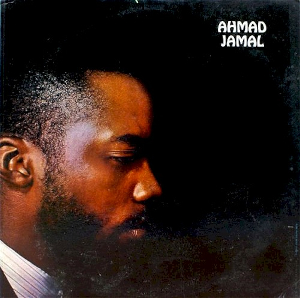
The Piano Scene of Ahmad Jamal is an album by American jazz pianist Ahmad Jamal. It contains performances from his earliest recording sessions for Okeh in 1951–52 in Chicago, and an Epic session from October 1955 in New York, NY. It includes additional selections from the sessions where the 1956 album The Ahmad Jamal Trio was recorded. The album was re-released in 2005 with additional tracks.

Ballades is the final album by American jazz pianist Ahmad Jamal. Consisting mostly of solo piano recordings, the album was recorded at the same time as the 2016 album Marseille. Jamal wrote of the album, "It includes my solo version of “Poinciana”, recorded between takes during our session for “Marseille”. My original version remains one of the most successful recordings in the history of instrumental music; and one of the most plagiarized."



















